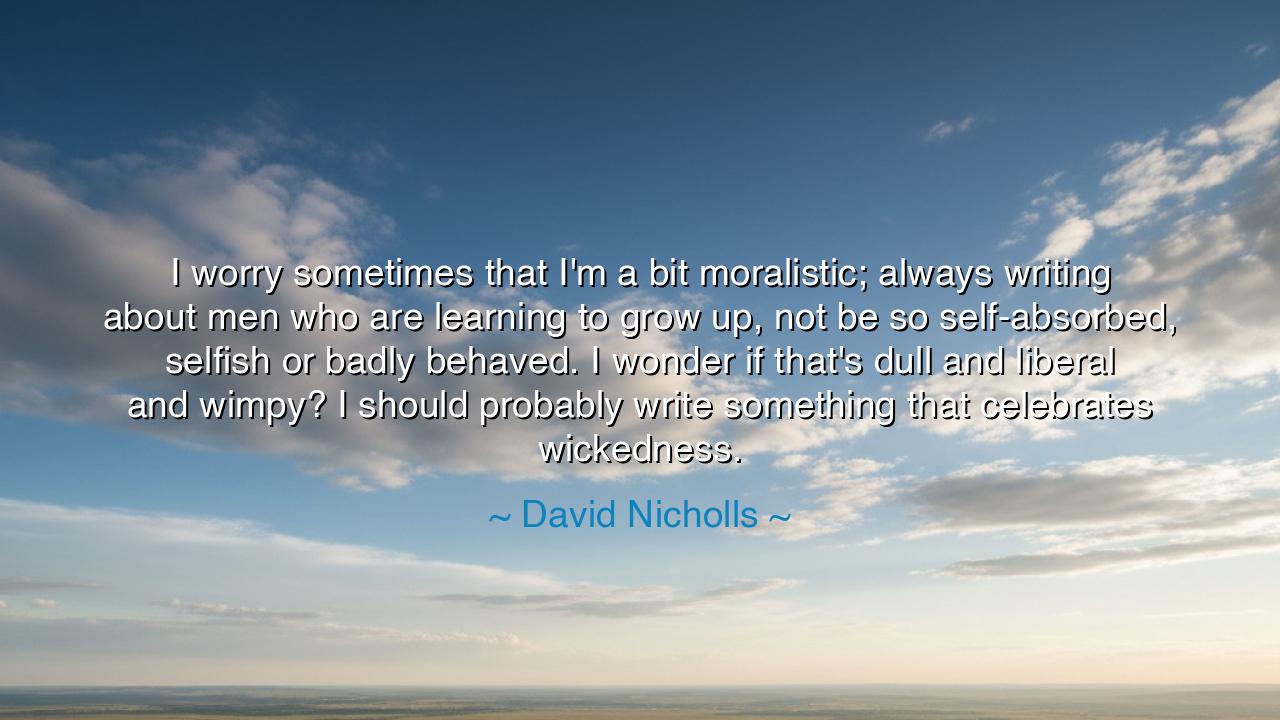
I worry sometimes that I'm a bit moralistic; always writing about
I worry sometimes that I'm a bit moralistic; always writing about men who are learning to grow up, not be so self-absorbed, selfish or badly behaved. I wonder if that's dull and liberal and wimpy? I should probably write something that celebrates wickedness.






When David Nicholls reflected, “I worry sometimes that I'm a bit moralistic; always writing about men who are learning to grow up, not be so self-absorbed, selfish or badly behaved. I wonder if that's dull and liberal and wimpy? I should probably write something that celebrates wickedness,” he laid bare the struggle of every artist who stands between virtue and vitality, between the yearning to teach and the temptation to entertain. His confession is not of weakness, but of awareness — an admission that morality and mischief are twin forces shaping the stories of humanity. In this reflection, he reveals the ancient tension between the poet and the prophet: one seeks to charm the heart, the other to change it.
Nicholls, known for works like One Day and Starter for Ten, often writes of flawed men awakening to empathy — to the quiet courage of growing up. In that transformation, he touches upon the timeless human drama: the passage from self-absorption to self-awareness. Yet even as he does so, he wonders whether goodness itself has lost its spark in a world that delights more in scandal than in sincerity. He asks what many writers fear to ask: can virtue still captivate? Can redemption still move the heart when wickedness shines brighter in the age of irony and appetite?
But to write of men learning to become better is not dull; it is heroic in a quiet way. The ancients knew this well. Consider the tale of Odysseus, who, after years of war and temptation, longs only to return home, to loyalty, to humility. His journey is not one of conquest but of character. Or think of Prince Hal in Shakespeare’s Henry IV, who sheds the recklessness of youth to become a just ruler. Their stories remind us that the path of growth is not meek, but magnificent. To conquer the self is the noblest battle of all — though it lacks the fireworks of villainy, it possesses the deeper thunder of the soul.
When Nicholls muses that he “should probably write something that celebrates wickedness,” he is not praising evil but recognizing its allure. For the wicked often sparkle where the good appear dim; they move boldly where the righteous hesitate. Literature has long been enchanted by the seductive dance of darkness — from Milton’s Satan, whose defiance burns with tragic grandeur, to Wilde’s Dorian Gray, whose beauty masks decay. Yet every such tale ends in the same revelation: that wickedness, while dazzling, is hollow; its brilliance fades beneath the weight of its own emptiness. The celebration of sin is a song that ends in silence.
And so, Nicholls’ so-called “moralism” is in truth an act of defiance — a rebellion against cynicism itself. In a time when irony mocks sincerity, and self-interest masquerades as wisdom, to write of growth and goodness is a radical gesture. The ancient sages would call it the philosopher’s duty — to remind men that greatness is not found in dominance, but in discipline; not in indulgence, but in integrity. The stories of flawed men who learn to love, to listen, to live rightly are not “wimpy” — they are the backbone of civilization.
The lesson within his reflection is this: never mistake compassion for weakness, nor moral purpose for dullness. The world is already full of chaos and cunning — what it lacks is conscience. Art that heals the soul, that mirrors our struggle toward decency, carries a power deeper than any tale of clever cruelty. For to awaken goodness in another’s heart is a form of creation far greater than any act of destruction.
And so, to the writers and dreamers who come after, let this teaching endure: it is not wrong to celebrate light in a world of shadows. The pen that sketches kindness does not tremble in cowardice — it stands against the storm. Write of men who rise, not only those who fall. Write of redemption as bravely as others write of ruin. For though wickedness may glitter, it is goodness that endures — quiet, steadfast, and eternal as the dawn.






AAdministratorAdministrator
Welcome, honored guests. Please leave a comment, we will respond soon